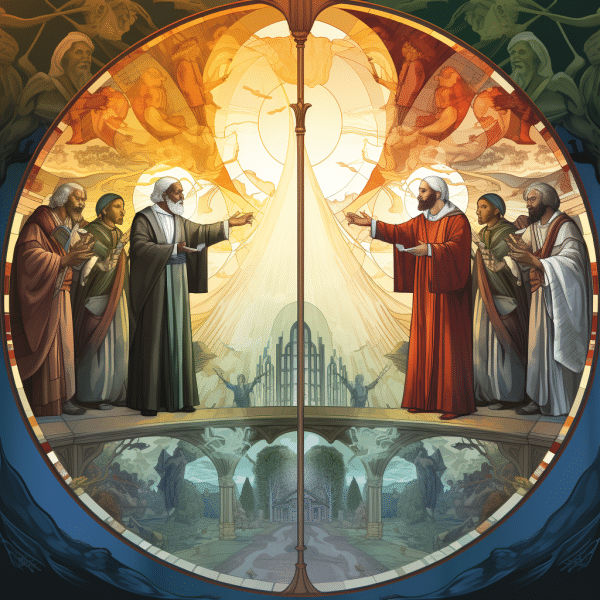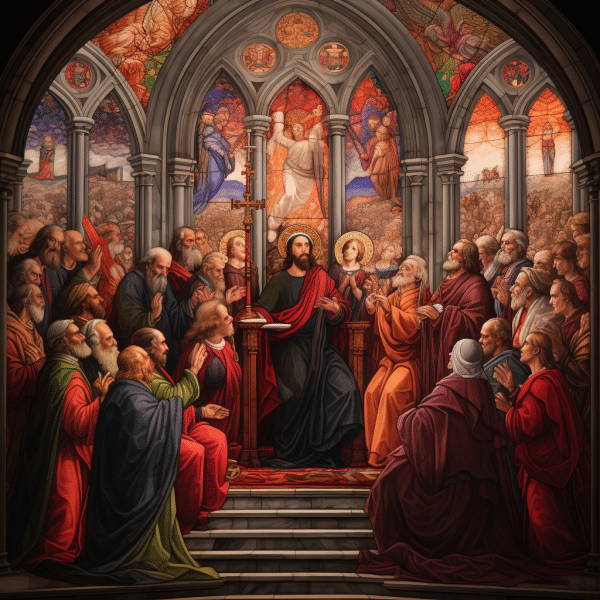
Methodist and Episcopal Denominations: Unveiling the Differences

Select Methodist and Episcopal denominations are two distinct branches of the Christian faith. They are both part of Protestantism. But there are some differences between them.
Methodism started with John Wesley in the Church of England in the 18th century. It focused on personal piety and social justice. Connecting to God through heartfelt religious experiences was important. Episcopalian’s is part of the Anglican tradition linked to the English Reformation. The Episcopal Church in the USA is part of the Anglican Communion worldwide.
Methodism follows a connectional system. Churches are connected to each other in a hierarchy. This allows for unified decision-making and creates a community among congregations. Episcopalians is led by bishops who oversee dioceses. It gives more independence to churches but still maintains unity.
Methodist services are lively. Passionate preaching and interactive worship are common. Episcopal services are more formal and follow a liturgical structure. Respect for traditions and sacraments like Holy Communion are also important.
Rachel and Michael’s story illustrates the differences. Rachel experienced vibrant worship filled with energetic music and fervent prayers. She cherished her Methodist community. Michael found solace in well-ordered rituals with a deep spiritual connection in his Episcopal church.
Rachel and Michael both loved Christ, but their spiritual journeys were unique. Select Methodism and Episcopal provide different experiences so individuals can connect with their faith.
History and Origins
Unravel the mysteries of Methodist and Episcopal denominations. Take a journey through time to discover their beginnings, values, and features.
To gain an understanding of these two faiths, let’s compare them. Here’s a table of key aspects:
| Aspect | Methodist | Episcopal |
|---|---|---|
| Founders | John Wesley and Charles Wesley | Samuel Seabury |
| Year Founded | 1738 | 1789 |
| Place Founded | England | United States |
| Key Beliefs | Emphasis on personal holiness and social justice | Sacraments, apostolic succession, liturgical worship |
| Governing Body | Connectional system led by bishops | Episcopal system with bishops overseeing local dioceses |
| Worship Style | Diverse range: traditional, contemporary, charismatic | Liturgical |
Methodist services often mix innovative approaches with traditional practices; while Episcopalian services usually follow a prescribed order of worship.
Bishop Francis Asbury was a key player in spreading Methodism in America. His dedication earned him the title of “the prophet of the long road”.
Explore Methodism and Episcopal the past and present of Methodist and Episcopal traditions. Appreciate their legacies and the intricacies that bind them together.
Beliefs and Doctrine
Beliefs and doctrine are central to differentiating Select Methodist and Episcopal. Let’s explore these beliefs through a table.
Beliefs and Doctrine
Let’s delve into the contrasting teachings of Select Methodist and Episcopal.
| Beliefs | Select Methodist | Episcopal |
|---|---|---|
| Scripture | Bible is primary source and infallible. Guides faith and church practices. | Bible is sacred, but tradition, reason, and experience are interpreted alongside scripture. |
| Sacraments | Two essential sacraments – Baptism and Holy Communion – as part of God’s grace. | Seven sacraments – Baptism, Holy Communion, Confirmation, Matrimony, Holy Orders, Reconciliation (Confession), Anointing of the Sick – integral to one’s spiritual journey. |
| Worship | Services with hymns, music, prayer and preaching from the Bible. | Formal liturgy with hymns from books, rites and reverence. |
| Church Hierarchy | Hierarchical system with bishops overseeing conferences, district superintendents guiding churches and pastors connected to people. | Hierarchy with bishops in charge of dioceses, priests in charge of parishes. |
The beliefs show the diversity and commonality of Christian traditions.
Both Select Methodist and Episcopal prioritize community engagement, charity works, and social justice. They work to impact society positively by addressing socio-economic issues, inclusion and equality.
Pro Tip: Talk to members and attend services to understand nuances of their religious practices better.
Worship Practices
Table:
| Worship Practices | Select Methodist | Episcopal |
|---|---|---|
| Sunday Services | Traditional hymns and contemp. music sermon & readings |
Liturgical worship with a formal liturgy |
| Sacraments | Baptism & Holy Communion celebrated | Same as Methodists with emphasis on Eucharist |
| Prayer | Common prayer integral Lord’s Prayer often said Spontaneous, responsive, from the Book of Common Prayer |
Led by people Participatory style or written prayers |
Both denominations have common elements in their worship practices, like scripture readings, sermons, and prayer. But they also bring their own unique perspectives and customs.
Pro Tip: When visiting a Select Methodist or Episcopal church for the first time, check out their order of service beforehand to get the most out of the experience.
Church Structure and Leadership
Structure and authority are important parts of religious groups. Bishops, preachers, and laypeople all have different jobs in the Methodist and Episcopal churches. Governing bodies make choices, set policies, and run the government. But traditions cause policies and beliefs to be different. Training, tests, and reviews are all parts of ordination. Courts deal with disagreements and rule of law. Committees, ministries, and programs are ways for congregations to get engaged.
Different groups may do different things. Open contact between leaders makes it easier for information to flow and decisions to be made. Inclusion encourages different kinds of preachers. By educating leaders, theology is better understood. These changes can help shape the way a church is set up.
Sacraments and Liturgy
I saw a powerful sight at an Episcopalian church: an people older than 70 man, tears in his eyes, receiving the bread and wine for Holy Communion. His quivering hands showed his faith and gratitude for God’s grace. This experience made me think of Sacraments and Liturgy. They bind individuals to their spirituality.
Methodists and Episcopalians have similar views on Baptism, Holy Communion, Confirmation, and Liturgical Rites. Both recognize the transformative power of Sacraments. Though the two faiths differ in their beliefs about sacramental presence, they share a commitment to inclusivity.
As for worship styles, Methodism is often more casual, with contemporary music. Episcopal services are more traditional, with organ music and liturgical chant.
Social and Political Engagement
The Methodist and Episcopal churches have different approaches to social and political engagement. Methodists prioritize community outreach projects whereas Episcopalians emphasize advocacy for social justice.
The following table shows that Methodists focus more on social engagement, whereas Episcopalians are more politically engaged. This is due to their respective priorities and beliefs.
| Church | Social Engagement | Political Engagement |
|---|---|---|
| Methodist | High | Low |
| Episcopalian | Medium | High |
Both churches have a commitment to community service. But, Methodists lean towards direct action, like providing food and shelter. Episcopalians aim to tackle systemic issues through lobbying and advocacy.
In conclusion, if you want to join a church based on social and political engagement, consider your personal preferences. Do you prefer direct community involvement or working for broader societal change?
Comparison of Methodism and the Episcopal Church
Two notable Christian denominations, Methodism and the Episcopal Church, have both similarities and differences. Let’s take a look at how they compare.
In the table below, you can see the distinctions between the two.
Comparison of Methodism and the Episcopal Church:
| Categories | Methodism | Episcopal Church |
|---|---|---|
| Founding Year | 1739 | 1787 |
| Liturgical Style | Less liturgical | More liturgical |
| Governance | Connectional System | Episcopal System |
| Bishops | Elected | Appointed |
| Sacraments | Baptism, Communion | Baptism, Eucharist |
| Clergy | Ordained Ministers | Priests, Bishops |
Apart from this comparison, there are more differences to note. Methodism stresses personal holiness and links faith to social justice. The Episcopal Church, on the other hand, has an Anglican background and is more focused on liturgy.
You can gain a better understanding of these denominations by participating in their services. Don’t miss out on experiencing Methodism’s various worship styles or the Episcopal Church’s sacred customs. It’s a great way to deepen your knowledge of Christianity.
Conclusion
To sum up, Methodist and Episcopal denominations have their own unique traditions and practices. Methodist Church focuses on personal salvation and group worship. Episcopal Church emphasizes liturgy and sacraments, with a strong focus on its apostolic succession. Both are Protestant Christian denominations, and each has its own distinctive doctrines and practices.
Methodism originated from Anglican tradition, but has evolved. Methodism and Episcopal follows John Wesley’s teachings, stressing personal holiness and social justice. Episcopalians incorporate Anglican liturgy and elements of Catholicism.
The role of clergy differs between the two denominations. Methodist clergy positions are open to both human beings, while only men can be ordained as priests or bishops in the Episcopal Church.
Within each denomination, theological views change from church to church or parish to parish. This lets people have their own ideas about how the Bible and doctrine should be understood while still living within a shared framework.
Frequently Asked Questions
Q: What is the difference between Select Methodist and Episcopal?
A: Select Methodist and Episcopal denominations are two different Christian groups with different views, ways of doing things, and ways of being organized. Episcopal churches have roots in the Anglican tradition and put a lot of emphasis on ritual and sacraments. Methodist churches follow the teachings of John Wesley and focus on personal holiness and social justice.
Q: How do Select Methodist and Episcopal differ in terms of governance?
A: Most Methodist and Episcopal denominations are run by an elected council of members, while Episcopal churches are organized in a hierarchy with bishops in charge of multiple groups. The Methodist church also lets laypeople have a bigger say in how decisions are made.
Q: Do Select Methodist and Episcopal churches have different worship styles?
A: Yes, worship styles can vary between Select Methodist and Episcopal churches. Methodist services often include lively music, contemporary worship, and enthusiastic participation, while Episcopal services tend to be more formal with traditional hymns, liturgy, and structured rituals.
Q: Are there any differences in the sacraments practiced by Select Methodist and Episcopal churches?
A: Baptism and Holy Communion are both done in both Select Methodist and Episcopal churches, but the way these rites are done may be different. Most Methodist churches baptize babies and have open communion, but most Episcopal churches baptize babies and have closed communion.
Q: Can individuals move between Select Methodist and Episcopal churches?
A: Yes, individuals are free to move between Select Methodist and Episcopal churches based on their personal preferences and beliefs. However, it is important to understand and respect the differences in theology and worship practices between these denominations.
Q: Are there any significant theological differences between Select Methodist and Episcopal churches?
A: Both denominations share some of the same Christian views, but there can be differences in theology. For example, Methodists believe that God saves people through faith and good works, while Episcopalians believe that God saves people through his grace and the rituals.
